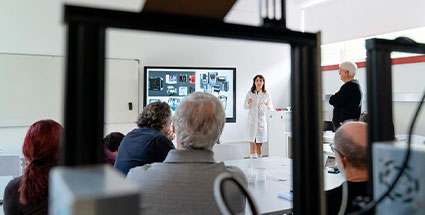Bachelor’s Degree in Biomedical Engineering
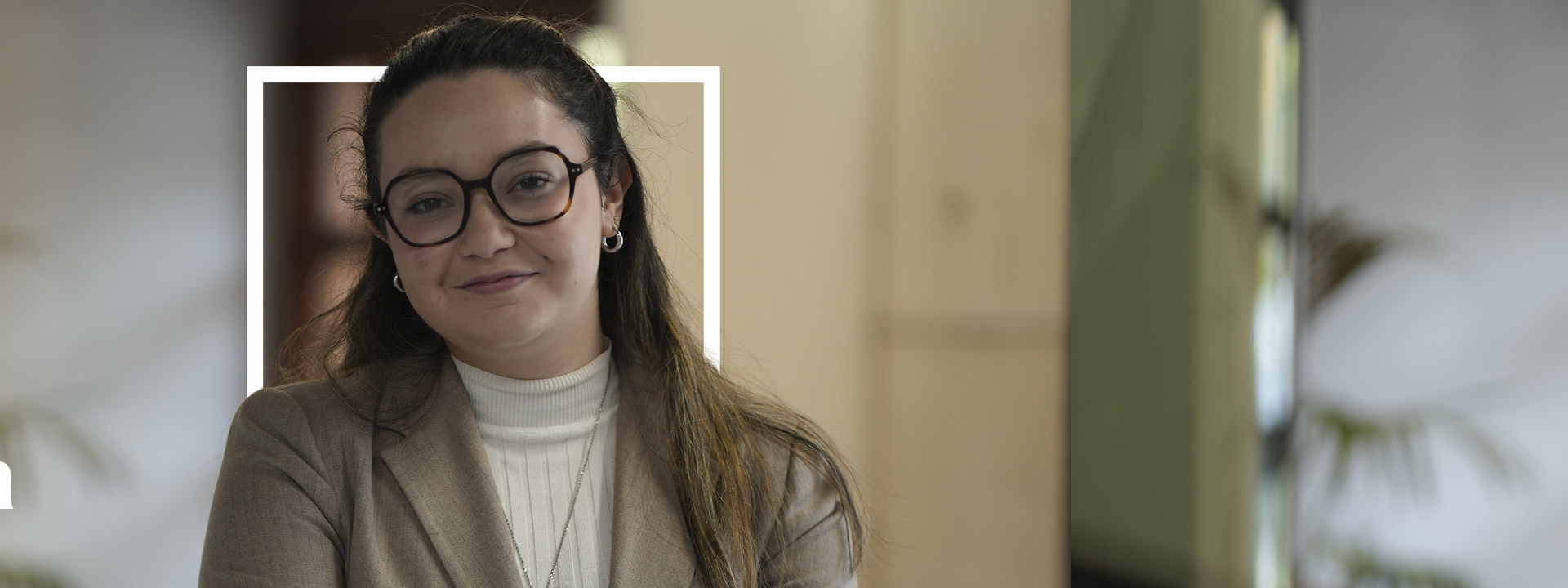
Real simulation environments and state-of-the-art equipment
Biomedical engineering provides an opportunity for engineers and technologists to use their skills to address some of the biggest challenges facing human life, improving quality of life and curing pathologies. The Biomedical Engineering sector ranges from gene therapies to scanners for hospitals, through medical image analysis, among others.
There is a great demand to train professionals who can find a solution to these global health challenges, which is why the sector has grown exponentially in the last two decades, and there is a great demand for degrees related to the development of these skills.
The World Health Organization (“Human resources for medical devices: The role of biomedical engineers”. 2017), states that more biomedical engineering professionals are needed to design, test, regulate, maintain and manage medical devices and provide training on their safe use in healthcare systems around the world.
This program is taught in collaboration with various companies, institutions and medical centers, such as the Genetics Service of the Ramón y Cajal Hospital, and the Advanced Planning and 3D Manufacturing Unit (UPAM3D) of the Gregorio Marañón University Hospital. Some members of these services will give seminars, classes and direct student's final research projects, bringing clinical translation closer and allowing students to develop professional competences.
The Bachelor's Degree in Biomedical Engineering from Nebrija University came to be due to the need to create professionals who are capable of providing solutions focused on improving people's quality of life, combining engineering, biology and medicine.
20% of tuition allocated to practical work
Curriculum
All our degrees and curricula have been prepared in accordance with the new guidelines set by current legislation, having already been verified by the National Agency for Quality Assessment.
The student must complete 240 credits
First year 62 ECTS
First Semester 30 ECTS- 4 ECTS | Introduction to Bioengineering
- 6 ECTS | Physics
- 6 ECTS | Cellular and molecular biology
- 6 ECTS | Calculus
- 4 ECTS | Programming
- 4 ECTS | Linear algebra
Second Semester 32 ECTS- 4 ECTS | Probability and biostatistics
- 6 ECTS | Chemistry
- 6 ECTS | Differential equations
- 4 ECTS | Electronic technology
- 6 ECTS | Biomaterials
- 6 ECTS | Fundamentals of anatomy and physiology
Second year 62 ECTS
First Semester 32 ECTS- 6 ECTS | Computational techniques in biology
- 6 ECTS | Biochemistry
- 6 ECTS | Fluids
- 4 ECTS | Scientific communication
- 4 ECTS | New technologies in medicine
- 6 ECTS | Fundamentals of experimental design
Second Semester 30 ECTS- 6 ECTS | Numerical methods
- 4 ECTS | Systems biology
- 4 ECTS | Financial management of projects
- 4 ECTS | Data science in medicine
- 6 ECTS | Instrumentation and biosensors
- 6 ECTS | Genomic technologies
Third year 60 ECTS
First Semester 30 ECTS- 4 ECTS | Creation and management of technological companies
- 6 ECTS | Computational biology
- 4 ECTS | Biomedical prototype design
- 6 ECTS | Experimental methods in biology
- 6 ECTS | Medical imaging systems and microscopy
- 4 ECTS | Simulation and modeling of systems
Second Semester 30 ECTS- 6 ECTS | Tissue Engineering
- 6 ECTS | Medical devices and implants
- 6 ECTS | Design challenge
- 3 electives to choose from:
4 ECTS | Advanced experimental biology
4 ECTS | Synthetic and in silico biology
4 ECTS | Advanced biomaterials
4 ECTS | Medical image segmentation
4 ECTS | Public Health and Epidemiology
Fourth year 56 ECTS
First Semester 14 ECTS- 6 ECTS | Bioethics and biomedical regulation
- 2 Electives to choose from:
4 ECTS | Complex biogrids
4 ECTS | Bioinformatics and Data Science in Biomedicine
4 ECTS | Biomanufacturing and microfluidics
Second Semester 12 ECTS- 12 ECTS | Final research project
Yearly 30 ECTS- 30 ECTS | Professional internship
Information on the types of Subjects
Program whose objective is to promote the practical training of students, under the continuous supervision of the University's Department of Professional Careers, the academic department corresponding to the degree, and the collaborating company or institution where the internships are carried out. Counsel is given on the choice of internships, and monitoring and tutoring is provided, always taking into account the professional orientation of each student.
More information on Internships in CompaniesThis project involves the student carrying out research tasks in various subjects, under the advice of one or more professors from the Department and, occasionally, professionals from the business world. For this, the student has the possibility of choosing a project among those offered.
Nebrija University, which is committed to languages and quality, provides the student with added value with the Diploma in English Professional Communication, which will allow him/her to achieve with confidence the competence demanded to successfully join the labor market.
It corresponds to level C1.
More information hereProfessors
| Profesores Professors | Porcentaje de Doctores Percentage of PhD holders |
| 15 | 80% |
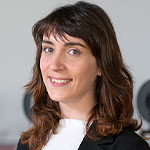 Nieves Cubo Mateo
Directora del Grado en Ingeniería Biomédica
Nieves Cubo Mateo
Directora del Grado en Ingeniería BiomédicaProfesora de Introducción a la Bioingeniería
Profesora de Programación PI of the Nebrija ARIES research group (Artificial Intelligence and Emerging Systems)
Professor of Introduction to Bioengineering
Professor of Programming Pionera en la Impresión 3D de tejidos humanos. Doctora en Farmacia por la Universidad Complutense de Madrid, e Ingeniería en Electrónica Industrial y Automática por la Universidad Carlos III de Madrid, donde también obtuvo el título de Máster en Ciencia e Ingeniería de Materiales. Evaluada positivamente por la ANECA en la categoría de Ayudante Doctor, Contratado Doctor y Profesora de Universidad Privada. Ha impartido docencia en la Universidad Internacional de Valencia, en el Grado de Informática (2021-2022) y en el Máster de Bioingeniería (2019-2022). También ha dado clase en la Escuela de Diseño Mecánico (EDDM) en el Máster de Fabricación Aditiva (MIFA) y en curso experto en impresión 3D Biomédico. Actualmente es profesora en el Grado en Ingeniería Informática. A nivel de investigación, ha publicado trabajos científicos dentro del área de la Bioingeniería en diferentes revistas internacionales (primer cuartil). Ha impartido conferencias en congresos internacionales y realizado estancias en el extranjero (Dresden, Alemania). Ha participado en varios proyectos de investigación (Plan Nacional de I+D+i , empresa privada e internacionales) y colabora con investigadores de la UCM, CSIC y la Technische Universität Dresden. Su investigación se centra en modelos y soluciones computacionales dentro del ámbito de la Bioingeniería y del Espacio, donde colabora con la Agencia Espacial Europea.
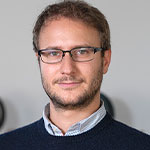 Alex Bernadí Forteza
Profesor de Programación
Professor of Programming
Graduado en Ingeniería Aeroespacial por la Universidad Politécnica de Madrid especializado en Propulsión Aeroespacial, además de haber realizado un Máster en Matemática Industrial realizado conjuntamente entre cinco de las principales universidades públicas españolas. Actualmente se encuentra realizando la tesis Doctoral conjuntamente con el equipo de investigación ARIES, de la Universidad Nebrija, y la Agencia Espacial Europea (ESA) sobre la generación de estructuras porosas estocásticas y autosustentadas para la impresión en 3D de tejido óseo y estructuras espaciales. Junto a Nieves Cubo, es responsable del Club de Exploración Espacial.
Alex Bernadí Forteza
Profesor de Programación
Professor of Programming
Graduado en Ingeniería Aeroespacial por la Universidad Politécnica de Madrid especializado en Propulsión Aeroespacial, además de haber realizado un Máster en Matemática Industrial realizado conjuntamente entre cinco de las principales universidades públicas españolas. Actualmente se encuentra realizando la tesis Doctoral conjuntamente con el equipo de investigación ARIES, de la Universidad Nebrija, y la Agencia Espacial Europea (ESA) sobre la generación de estructuras porosas estocásticas y autosustentadas para la impresión en 3D de tejido óseo y estructuras espaciales. Junto a Nieves Cubo, es responsable del Club de Exploración Espacial.
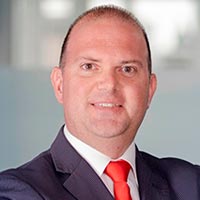 Juan Casado Vela
Profesor de Gestión económica de proyectos
Professor of Economic project management
Doctor en biotecnología por la Universidad de Alicante y BBA por la UNED. Durante su dilatada experiencia profesional, Juan ha combinado el mundo académico con el mundo empresarial, con roles muy ligados al ámbito investigador e innovador como senior project manager para el CSIC, director de certificación de I+D+i y Responsabilidad Social Corporativa, profesor asociado de bioingeniería y biotecnología en la Universidad Carlos III de Madrid y director científico de Innova Health, entre otros. Actualmente, Juan es profesor y director de financiación e inversión en proyectos en Ayming.
Juan Casado Vela
Profesor de Gestión económica de proyectos
Professor of Economic project management
Doctor en biotecnología por la Universidad de Alicante y BBA por la UNED. Durante su dilatada experiencia profesional, Juan ha combinado el mundo académico con el mundo empresarial, con roles muy ligados al ámbito investigador e innovador como senior project manager para el CSIC, director de certificación de I+D+i y Responsabilidad Social Corporativa, profesor asociado de bioingeniería y biotecnología en la Universidad Carlos III de Madrid y director científico de Innova Health, entre otros. Actualmente, Juan es profesor y director de financiación e inversión en proyectos en Ayming.
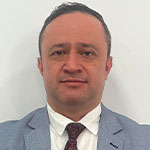 Ernesto Correa Velandia
Profesor de Ecuaciones diferenciales
Professor of Differential Equations
Soy un matemático aplicado con una sólida formación académica y una amplia experiencia en investigación y docencia. Me gradué como Doctor en Ingeniería Matemática de la Universidad Carlos III de Madrid y también tengo una formación en matemáticas de la Universidad Nacional de Colombia. Además, poseo una Maestría en Física y Matemáticas de la Universidad de Granada y otra en Ingeniería Matemática de la Universidad Carlos III de Madrid.
Mis áreas de interés incluyen el análisis matemático, las ecuaciones diferenciales y la creación de modelos matemáticos para describir fenómenos naturales. Me apasiona explorar las complejidades de la naturaleza a través de la lente de las matemáticas y buscar soluciones innovadoras para desafíos científicos y tecnológicos.
Actualmente, trabajo en investigación y desarrollo (I+D) en el sector privado, donde aplico mis conocimientos matemáticos para resolver problemas prácticos y desarrollar soluciones innovadoras. Además, tengo el privilegio de compartir mi experiencia y conocimientos como docente en diversas universidades, incluyendo la Universidad Carlos III de Madrid (UC3M) y la Universidad Francisco de Vitoria (UFV). Imparto asignaturas como cálculo, estadística, ecuaciones diferenciales, álgebra lineal y criptografía, donde disfruto inspirando a la próxima generación de profesionales en el campo de las matemáticas y la ingeniería.
Ernesto Correa Velandia
Profesor de Ecuaciones diferenciales
Professor of Differential Equations
Soy un matemático aplicado con una sólida formación académica y una amplia experiencia en investigación y docencia. Me gradué como Doctor en Ingeniería Matemática de la Universidad Carlos III de Madrid y también tengo una formación en matemáticas de la Universidad Nacional de Colombia. Además, poseo una Maestría en Física y Matemáticas de la Universidad de Granada y otra en Ingeniería Matemática de la Universidad Carlos III de Madrid.
Mis áreas de interés incluyen el análisis matemático, las ecuaciones diferenciales y la creación de modelos matemáticos para describir fenómenos naturales. Me apasiona explorar las complejidades de la naturaleza a través de la lente de las matemáticas y buscar soluciones innovadoras para desafíos científicos y tecnológicos.
Actualmente, trabajo en investigación y desarrollo (I+D) en el sector privado, donde aplico mis conocimientos matemáticos para resolver problemas prácticos y desarrollar soluciones innovadoras. Además, tengo el privilegio de compartir mi experiencia y conocimientos como docente en diversas universidades, incluyendo la Universidad Carlos III de Madrid (UC3M) y la Universidad Francisco de Vitoria (UFV). Imparto asignaturas como cálculo, estadística, ecuaciones diferenciales, álgebra lineal y criptografía, donde disfruto inspirando a la próxima generación de profesionales en el campo de las matemáticas y la ingeniería.
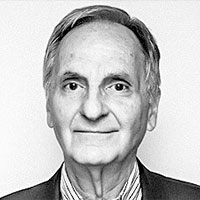 Carlos Augusto Di Prisco de Venanzi
Profesor de Cálculo
Professor of Calculus
Licenciado en Matemáticas (Universidad Central de Venezuela), PhD. Matemáticas (Massachusetts Institute of Technology, USA, 1976). Segundo Vicepresidente de la Academia de Ciencias Físicas, Matemáticas y Naturales (2009-2011). Investigador del Departamento de Matemáticas del Instituto Venezolano de Investigaciones Científicas (IVIC) desde 1976. Investigador Emérito del IVIC (2007). Decano del Centro de Estudios Avanzados del IVIC 1989-1991. Docente del Departamento de Matemáticas de la Facultad de Ciencias de la Universidad Central de Venezuela desde 1976. Profesor Titular desde 1985, Jubilado desde 2003. Con su trabajo sobre diversos aspectos de la teoría de conjuntos y los fundamentos matemáticos sobre varios temas de la teoría combinatoria de conjuntos, ha publicado varios libros de texto, y artículos científicos en revistas de prestigio, como Advances in Mathematics, Journal of Symbolic Logic, Mathematical Logic Quarterly, Fundamenta Mathematicae, Proceedings of the American Mathematical Society. Ha hecho contribuciones al estudio de estructuras combinatorias relacionadas con propiedades de grandes cardinales y de propiedades combinatorias de conjuntos de números naturales y conjuntos de números reales, y sobre formas débiles del axioma de elección. Sus resultados más recientes tratan problemas relacionados con la Teoría de Ramsey. Ha dirigido más de 40 tesis de pre y postgrado. Recipiente del premio «Lorenzo Mendoza Fleury» de la Fundación Polar, 1983. Miembro del Centro de Lógica de la Universidad de Campinas, Brasil, desde 1988. Profesor invitado en Smith College (Massachusetts, 1985-1986); del Research Associate University of California, Berkeley (1992-1993); y del Centre de Recerca Matematica, Bellaterra, España, (1997-1998). Catedrático Visitante de la Universidad de Evora, Portugal, (2000); y de la Universidad de Paris VII, (2000 y 2006). Investigador Visitante del Institut Catalan de Recerca i Estudis Avançats (2002-2005); Profesor Visitante Lluis Santaló, Centre de Recerca Matemática, Barcelona. (2010); de la Universidad de Los Andes, Bogotá, Colombia (2012-2014). Fellow, del John Simon Guggenheim Memorial Foundation, (1991-1992); y de la Third World Academy of Sciences (desde 1999). Miembro Academia de Ciencias de América Latina (desde 2016).
Carlos Augusto Di Prisco de Venanzi
Profesor de Cálculo
Professor of Calculus
Licenciado en Matemáticas (Universidad Central de Venezuela), PhD. Matemáticas (Massachusetts Institute of Technology, USA, 1976). Segundo Vicepresidente de la Academia de Ciencias Físicas, Matemáticas y Naturales (2009-2011). Investigador del Departamento de Matemáticas del Instituto Venezolano de Investigaciones Científicas (IVIC) desde 1976. Investigador Emérito del IVIC (2007). Decano del Centro de Estudios Avanzados del IVIC 1989-1991. Docente del Departamento de Matemáticas de la Facultad de Ciencias de la Universidad Central de Venezuela desde 1976. Profesor Titular desde 1985, Jubilado desde 2003. Con su trabajo sobre diversos aspectos de la teoría de conjuntos y los fundamentos matemáticos sobre varios temas de la teoría combinatoria de conjuntos, ha publicado varios libros de texto, y artículos científicos en revistas de prestigio, como Advances in Mathematics, Journal of Symbolic Logic, Mathematical Logic Quarterly, Fundamenta Mathematicae, Proceedings of the American Mathematical Society. Ha hecho contribuciones al estudio de estructuras combinatorias relacionadas con propiedades de grandes cardinales y de propiedades combinatorias de conjuntos de números naturales y conjuntos de números reales, y sobre formas débiles del axioma de elección. Sus resultados más recientes tratan problemas relacionados con la Teoría de Ramsey. Ha dirigido más de 40 tesis de pre y postgrado. Recipiente del premio «Lorenzo Mendoza Fleury» de la Fundación Polar, 1983. Miembro del Centro de Lógica de la Universidad de Campinas, Brasil, desde 1988. Profesor invitado en Smith College (Massachusetts, 1985-1986); del Research Associate University of California, Berkeley (1992-1993); y del Centre de Recerca Matematica, Bellaterra, España, (1997-1998). Catedrático Visitante de la Universidad de Evora, Portugal, (2000); y de la Universidad de Paris VII, (2000 y 2006). Investigador Visitante del Institut Catalan de Recerca i Estudis Avançats (2002-2005); Profesor Visitante Lluis Santaló, Centre de Recerca Matemática, Barcelona. (2010); de la Universidad de Los Andes, Bogotá, Colombia (2012-2014). Fellow, del John Simon Guggenheim Memorial Foundation, (1991-1992); y de la Third World Academy of Sciences (desde 1999). Miembro Academia de Ciencias de América Latina (desde 2016).
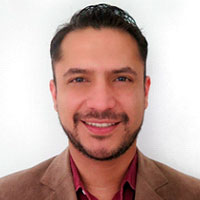 Redlich Javier García Rojas
Profesor de Física
Professor of Physics
Ingeniero Mecánico y Magister Scientiarum en Ingeniería Mecánica, mención: Termociencias Computacional por la Universidad del Zulia – Venezuela. Doctor en Ciencias de la Ingeniería, área Mecánica en la Pontificia Universidad Católica de Chile, especializado en energía solar de entornos urbanos. Con más de 10 años de experiencia en educación superior ligada con la industria. Convirtiéndose en un modelador de sistemas termo-físicos y de fluidos, y especialista en simulación. Posee un amplio conocimiento en turbomaquinarias y equipos de procesos; actualmente desarrollándose en el área de Energía Solar, tanto en plantas fotovoltaicas, plantas de Concentración y evaluación de recurso. Alto mando en las habilidades de comunicación y liderazgo efectivo, que permite la participación productiva en equipos multidisciplinarios, persiguiendo la mejora a través de la aplicación de tecnologías de vanguardias en ingeniería. Experiencia en países como Chile, Australia y España en el área docente y profesional. Publicaciones científicas en el área de energías renovables en revistas internacionales y participación en diversos congresos científicos internacionales.
Redlich Javier García Rojas
Profesor de Física
Professor of Physics
Ingeniero Mecánico y Magister Scientiarum en Ingeniería Mecánica, mención: Termociencias Computacional por la Universidad del Zulia – Venezuela. Doctor en Ciencias de la Ingeniería, área Mecánica en la Pontificia Universidad Católica de Chile, especializado en energía solar de entornos urbanos. Con más de 10 años de experiencia en educación superior ligada con la industria. Convirtiéndose en un modelador de sistemas termo-físicos y de fluidos, y especialista en simulación. Posee un amplio conocimiento en turbomaquinarias y equipos de procesos; actualmente desarrollándose en el área de Energía Solar, tanto en plantas fotovoltaicas, plantas de Concentración y evaluación de recurso. Alto mando en las habilidades de comunicación y liderazgo efectivo, que permite la participación productiva en equipos multidisciplinarios, persiguiendo la mejora a través de la aplicación de tecnologías de vanguardias en ingeniería. Experiencia en países como Chile, Australia y España en el área docente y profesional. Publicaciones científicas en el área de energías renovables en revistas internacionales y participación en diversos congresos científicos internacionales.
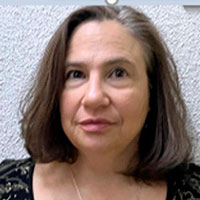 Ana Handler
Profesora de Química
Professor of Chemistry
Licenciada en Ciencias, sección Químicas, especialidad Bioquímica y Biología Molecular. Doctora en Bioquímica y Biología Molecular. Ambos títulos obtenidos en la Universidad Autónoma de Madrid. Posee el Certificado de Aptitud Pedagógica por la Universidad Complutense de Madrid. Cuenta con una amplia experiencia investigadora en Biomedicina. Realizó la tesis doctoral en el Hospital Ramón y Cajal en el área de Neurobiología, posteriormente siguió investigando en esta área en el Instituto de Investigaciones Biomédicas Alberto Sols del CSIC. De allí pasó al Instituto Nacional de Investigaciones Agroalimentarias en el campo de la Sanidad Animal. Así mismo tiene una larga trayectoria docente en Universidades, en Educación Secundaria, en Formación Profesional e impartiendo Talleres de Ciencias para niños y adolescentes. Sus líneas de investigación se centran en la neurobiología, la inmunología y el diseño de vacunas DNA en sanidad animal. Ha participado en 10 proyectos de investigación públicos y privados, los cuales han dado lugar a 8 publicaciones científicas internacionales y nacionales, con 144 citaciones y un índice h de 6 (según Scopus) y 8 contribuciones a congresos internacionales y nacionales.
Ana Handler
Profesora de Química
Professor of Chemistry
Licenciada en Ciencias, sección Químicas, especialidad Bioquímica y Biología Molecular. Doctora en Bioquímica y Biología Molecular. Ambos títulos obtenidos en la Universidad Autónoma de Madrid. Posee el Certificado de Aptitud Pedagógica por la Universidad Complutense de Madrid. Cuenta con una amplia experiencia investigadora en Biomedicina. Realizó la tesis doctoral en el Hospital Ramón y Cajal en el área de Neurobiología, posteriormente siguió investigando en esta área en el Instituto de Investigaciones Biomédicas Alberto Sols del CSIC. De allí pasó al Instituto Nacional de Investigaciones Agroalimentarias en el campo de la Sanidad Animal. Así mismo tiene una larga trayectoria docente en Universidades, en Educación Secundaria, en Formación Profesional e impartiendo Talleres de Ciencias para niños y adolescentes. Sus líneas de investigación se centran en la neurobiología, la inmunología y el diseño de vacunas DNA en sanidad animal. Ha participado en 10 proyectos de investigación públicos y privados, los cuales han dado lugar a 8 publicaciones científicas internacionales y nacionales, con 144 citaciones y un índice h de 6 (según Scopus) y 8 contribuciones a congresos internacionales y nacionales.
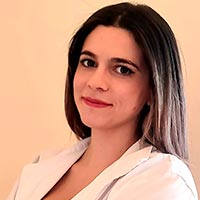 Ana María Jimenez García
Profesora de Diseño Experimental
Professor of Experimental Design
Graduada en Psicología, Máster en Neurociencias y Dolor; y Doctora en Biomedicina por la Universidad de Granada (UGR, 2014, 2015 y 2020). Ha sido beneficiada con numerosos contratos de investigación en Departamento de Farmacología (Facultad de Medicina, UGR) y en el Departamento de Psicología Básica y Experimental (Facultad de Psicología, UGR) donde pudo formarse en la investigación animal y en humanos, respectivamente. Durante su formación en el área ha colaborado con diversos proyectos de investigación relacionados con las neurociencias; concretamente, sobre el efecto de las experiencias previas en la respuesta emocional y su modulación por parte de agentes externos tales como el alcohol o los estímulos dolorosos. Además, ha realizado investigaciones sobre screening farmacológico con fármacos diana para el tratamiento de la ansiedad y depresión. En el año 2018 realizó una estancia predoctoral en el Instituto de Investigaciones Biomédicas Mercedes y Martin Ferreyra (Córdoba, Argentina) bajo la supervisión del Dr. Ricardo M. Pautassi, siendo un investigador de referencia en los estudios sobre alcohol en modelos animales. Actualmente, forma parte del grupo BRABE en la línea sobre enfermedades neurodegenerativas de la U. Nebrija.
Ana María Jimenez García
Profesora de Diseño Experimental
Professor of Experimental Design
Graduada en Psicología, Máster en Neurociencias y Dolor; y Doctora en Biomedicina por la Universidad de Granada (UGR, 2014, 2015 y 2020). Ha sido beneficiada con numerosos contratos de investigación en Departamento de Farmacología (Facultad de Medicina, UGR) y en el Departamento de Psicología Básica y Experimental (Facultad de Psicología, UGR) donde pudo formarse en la investigación animal y en humanos, respectivamente. Durante su formación en el área ha colaborado con diversos proyectos de investigación relacionados con las neurociencias; concretamente, sobre el efecto de las experiencias previas en la respuesta emocional y su modulación por parte de agentes externos tales como el alcohol o los estímulos dolorosos. Además, ha realizado investigaciones sobre screening farmacológico con fármacos diana para el tratamiento de la ansiedad y depresión. En el año 2018 realizó una estancia predoctoral en el Instituto de Investigaciones Biomédicas Mercedes y Martin Ferreyra (Córdoba, Argentina) bajo la supervisión del Dr. Ricardo M. Pautassi, siendo un investigador de referencia en los estudios sobre alcohol en modelos animales. Actualmente, forma parte del grupo BRABE en la línea sobre enfermedades neurodegenerativas de la U. Nebrija.
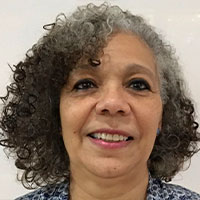 Brígida Molina Carabaño
Profesora de Métodos Numéricos
Professor of Numerical Methods
Licenciada y Magister en Matemáticas por la Universidad Central de Venezuela (UCV). Doctorado en Ciencias de la Computación por la UCV en cooperación con el Laboratorio LIP6 de la Universidad Pierre y Marie Curie, París, Francia. Postdoctorado en la Universidad de Ciencias y Tecnologías de Lille, Francia. Ha impartido clases en el área de matemáticas aplicadas, tanto en pregrado como en postgrado, en la UCV y en universidades privadas de Lima, Perú. Ha sido profesora invitada en diversas instituciones y conferencias internacionales. Sus intereses de investigación incluyen algoritmos para cálculos a gran escala, simulación de yacimientos y métodos del álgebra lineal para el análisis de datos. Ha publicado en revistas científicas indexadas.
Brígida Molina Carabaño
Profesora de Métodos Numéricos
Professor of Numerical Methods
Licenciada y Magister en Matemáticas por la Universidad Central de Venezuela (UCV). Doctorado en Ciencias de la Computación por la UCV en cooperación con el Laboratorio LIP6 de la Universidad Pierre y Marie Curie, París, Francia. Postdoctorado en la Universidad de Ciencias y Tecnologías de Lille, Francia. Ha impartido clases en el área de matemáticas aplicadas, tanto en pregrado como en postgrado, en la UCV y en universidades privadas de Lima, Perú. Ha sido profesora invitada en diversas instituciones y conferencias internacionales. Sus intereses de investigación incluyen algoritmos para cálculos a gran escala, simulación de yacimientos y métodos del álgebra lineal para el análisis de datos. Ha publicado en revistas científicas indexadas.
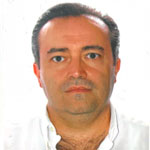 Luis Miguel Pintado Mateos
Profesor de Biología Celular y Molecular
Professor of Cellular and Molecular Biology
Licenciado en Ciencias (sección Biología) especialidad Bioquímica y Biología Molecular por la Universidad Autónoma de Madrid. Diplomado en Óptica y Optometría por la Universidad Europea de Madrid. Curso de Aptitud Pedagógica. Master en Dirección de Marketing y Comunicación por el IEDE. Master en Dirección de gabinetes de Audioprótesis por la Universidad de Santiago de Compostela. Master en Organización y Gestión de Ópticas por la Fundación Politécnica de Cataluña (UPC). Director Técnico de “MULTIÓPTICAS BUENAVISTA Y CENTRO AUDIOLOGICO HELIX”. “Opticalia Ferraz” y “Opticalia Garcilent”. Profesor de Comunicación Corporativa y Marketing en Instituto Europeo de Diseño y en IEDE.Profesor de Biología y de Bioquímica para Optometristas en la Facultad de Ciencias de la Salud de la Universidad Europea.
Luis Miguel Pintado Mateos
Profesor de Biología Celular y Molecular
Professor of Cellular and Molecular Biology
Licenciado en Ciencias (sección Biología) especialidad Bioquímica y Biología Molecular por la Universidad Autónoma de Madrid. Diplomado en Óptica y Optometría por la Universidad Europea de Madrid. Curso de Aptitud Pedagógica. Master en Dirección de Marketing y Comunicación por el IEDE. Master en Dirección de gabinetes de Audioprótesis por la Universidad de Santiago de Compostela. Master en Organización y Gestión de Ópticas por la Fundación Politécnica de Cataluña (UPC). Director Técnico de “MULTIÓPTICAS BUENAVISTA Y CENTRO AUDIOLOGICO HELIX”. “Opticalia Ferraz” y “Opticalia Garcilent”. Profesor de Comunicación Corporativa y Marketing en Instituto Europeo de Diseño y en IEDE.Profesor de Biología y de Bioquímica para Optometristas en la Facultad de Ciencias de la Salud de la Universidad Europea.
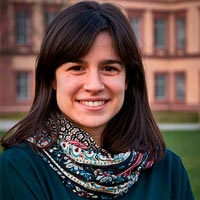 Elena Remacha Motta
Profesora de Fluidos
Professor of Fluids
Estudió Ingeniería Biomédica en la Universidad Carlos III de Madrid. En 2018 se incorporó al proyecto Horizon2020 4DHeart para realizar su doctorado en Microscopía de Lámina de Luz y Desarrollo Cardíaco en Pez Cebra, en una colaboración entre el Instituto de Genética y Biología Molecular y Celular de Estrasburgo y Leica Microsystems. Posteriormente ha trabajado como Gestora de Proyectos de I+D en QUIBIM, como investigadora postdoctoral en la Universidad de Medicina de Berlín (Charité), y como responsable del área de proyectos I+D+i en la empresa IDavinci.
Elena Remacha Motta
Profesora de Fluidos
Professor of Fluids
Estudió Ingeniería Biomédica en la Universidad Carlos III de Madrid. En 2018 se incorporó al proyecto Horizon2020 4DHeart para realizar su doctorado en Microscopía de Lámina de Luz y Desarrollo Cardíaco en Pez Cebra, en una colaboración entre el Instituto de Genética y Biología Molecular y Celular de Estrasburgo y Leica Microsystems. Posteriormente ha trabajado como Gestora de Proyectos de I+D en QUIBIM, como investigadora postdoctoral en la Universidad de Medicina de Berlín (Charité), y como responsable del área de proyectos I+D+i en la empresa IDavinci.
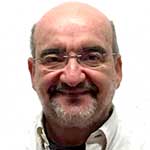 Rafael Sánchez Lamoneda
Profesor de Álgebra lineal
Professor of Linear Algebra
PhD en Matemáticas de Brandeis University, Massachusetts, USA, con equivalencia de la Universidad Carlos III de Madrid. Ha escrito varios artículos sobre Algebra Conmutativa y Homológica en revistas internacionales y ha sido tutor de estudiantes para la elaboración de sus tesis de pregrado, maestría y doctorado en matemáticas y en educación matemática.Jjefe del Departamento de Matemáticas del Instituto Venezolano de Investigaciones Científicas, IVIC y miembro de la Comisión de postgrado de ese Instituto y de la Escuela de Matemáticas de la Universidad Central de Venezuela, UCV. Formo parte de equipos multidisciplinarios para el mejoramiento de la enseñanza de las matemáticas en el Centro Nacional para el Mejoramiento de la Enseñanza de la Ciencia, CENAMEC, en Venezuela. Premio Erdös 2010 otorgado por la World Federation for National Mathematical Competitions. Premio al mejor trabajo en el área de Matemáticas otorgado por el Consejo Nacional de Investigaciones Científicas y Tecnológicas de Venezuela, Conicit en el año 1993. Orden José María Vargas, UCV, 2007. Ha trabajado en las Olimpiadas Matemáticas en Venezuela desde 1978, ha sido jefe o tutor de delegaciones del país en Olimpiadas de Matemáticas Internacionales desde 1981. Actual presidente del Comité de Ética de la Olimpiada Internacional de Matemáticas, IMO y miembro del consejo asesor por elección desde 2012 al 2016. Asesor de la Organización de Estados Iberoamericanos para la Educación la Ciencia y la Cultura, OEI, en el área de Matemáticas y Olimpiadas Matemáticas. Asesor en el área de Matemáticas de la Academia de Ciencias Físicas, Matemáticas y Naturales de Venezuela. Presidente de la Asociación Venezolana de Competencias Matemáticas y de la Asociación Matemática Venezolana. Profesor asociado del programa de maestría y doctorado de la universidad Antonio Nariño, Bogotá, Colombia desde 2015. Profesor de la universidad Antonio Nebrija desde enero 2023.
Rafael Sánchez Lamoneda
Profesor de Álgebra lineal
Professor of Linear Algebra
PhD en Matemáticas de Brandeis University, Massachusetts, USA, con equivalencia de la Universidad Carlos III de Madrid. Ha escrito varios artículos sobre Algebra Conmutativa y Homológica en revistas internacionales y ha sido tutor de estudiantes para la elaboración de sus tesis de pregrado, maestría y doctorado en matemáticas y en educación matemática.Jjefe del Departamento de Matemáticas del Instituto Venezolano de Investigaciones Científicas, IVIC y miembro de la Comisión de postgrado de ese Instituto y de la Escuela de Matemáticas de la Universidad Central de Venezuela, UCV. Formo parte de equipos multidisciplinarios para el mejoramiento de la enseñanza de las matemáticas en el Centro Nacional para el Mejoramiento de la Enseñanza de la Ciencia, CENAMEC, en Venezuela. Premio Erdös 2010 otorgado por la World Federation for National Mathematical Competitions. Premio al mejor trabajo en el área de Matemáticas otorgado por el Consejo Nacional de Investigaciones Científicas y Tecnológicas de Venezuela, Conicit en el año 1993. Orden José María Vargas, UCV, 2007. Ha trabajado en las Olimpiadas Matemáticas en Venezuela desde 1978, ha sido jefe o tutor de delegaciones del país en Olimpiadas de Matemáticas Internacionales desde 1981. Actual presidente del Comité de Ética de la Olimpiada Internacional de Matemáticas, IMO y miembro del consejo asesor por elección desde 2012 al 2016. Asesor de la Organización de Estados Iberoamericanos para la Educación la Ciencia y la Cultura, OEI, en el área de Matemáticas y Olimpiadas Matemáticas. Asesor en el área de Matemáticas de la Academia de Ciencias Físicas, Matemáticas y Naturales de Venezuela. Presidente de la Asociación Venezolana de Competencias Matemáticas y de la Asociación Matemática Venezolana. Profesor asociado del programa de maestría y doctorado de la universidad Antonio Nariño, Bogotá, Colombia desde 2015. Profesor de la universidad Antonio Nebrija desde enero 2023.
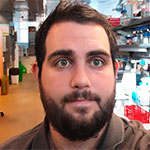 Álvaro Serrano Navarro
Profesor de Probabilidad y bioestadística
Professor of Probability and Biostatistics
Álvaro Serrano Navarro, PhD. Doctor en Biociencias Moleculares de la Universidad Autónoma de Madrid, máster en Bioinformática para las ciencias de la salud de la Universidad Pompeu Fabra y graduado en Bioquímica por la Universidad de Castilla-La Mancha. Su experiencia laboral incluye roles significativos, como Asistente de Investigación en el Instituto Karolinska en Estocolmo. Además, ha compartido su conocimiento como profesor invitado en el Master de Bioinformática y Biología Computacional en la UAM, enseñando la asignatura de SGTR. Durante su tesis ha trabajado en la detección de mutaciones somáticas utilizando métodos computacionales y ha implementado modelos de probabilidad bayesianos para el diseño experimental de aproximaciones de secuenciación de alta profundidad.
Álvaro Serrano Navarro
Profesor de Probabilidad y bioestadística
Professor of Probability and Biostatistics
Álvaro Serrano Navarro, PhD. Doctor en Biociencias Moleculares de la Universidad Autónoma de Madrid, máster en Bioinformática para las ciencias de la salud de la Universidad Pompeu Fabra y graduado en Bioquímica por la Universidad de Castilla-La Mancha. Su experiencia laboral incluye roles significativos, como Asistente de Investigación en el Instituto Karolinska en Estocolmo. Además, ha compartido su conocimiento como profesor invitado en el Master de Bioinformática y Biología Computacional en la UAM, enseñando la asignatura de SGTR. Durante su tesis ha trabajado en la detección de mutaciones somáticas utilizando métodos computacionales y ha implementado modelos de probabilidad bayesianos para el diseño experimental de aproximaciones de secuenciación de alta profundidad.
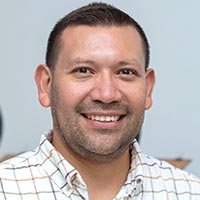 Juan José Uriarte Díaz
Profesor del área de Electrónica y biomateriales
Professor of Electronics and biomaterials area
Ingeniero Biomédico, investigador y docente enfocado en la ingeniería aplicada en áreas clave de la medicina regenerativa. Su investigación se centra en la MECANOBIOLOGÍA, un campo que explora cómo los cambios del microambiente influyen en las respuestas de las células y los tejidos. En particular, estudio el papel de la matriz extracelular (ECM) en las patologías pulmonares. Como educador promueve el aprendizaje experiencial y la investigación traslacional, integrando enfoques interdisciplinarios y tecnológicos que enriquecen la experiencia de los estudiantes, desde un punto de vista multidisciplinar.
Juan José Uriarte Díaz
Profesor del área de Electrónica y biomateriales
Professor of Electronics and biomaterials area
Ingeniero Biomédico, investigador y docente enfocado en la ingeniería aplicada en áreas clave de la medicina regenerativa. Su investigación se centra en la MECANOBIOLOGÍA, un campo que explora cómo los cambios del microambiente influyen en las respuestas de las células y los tejidos. En particular, estudio el papel de la matriz extracelular (ECM) en las patologías pulmonares. Como educador promueve el aprendizaje experiencial y la investigación traslacional, integrando enfoques interdisciplinarios y tecnológicos que enriquecen la experiencia de los estudiantes, desde un punto de vista multidisciplinar.
More Academic Information
Official Degree:Bachelor's Degree in Biomedical Engineering
The admission profile in terms of skills, abilities and previous knowledge will be that of the student who has passed the baccalaureate in the technological field. More specifically, the following qualities are desirable within the student body:
• Basic knowledge of mathematics, physics, chemistry, graphic expression and computer science.
• Full ability for reading, reflection and oral and written communication.
• Knowledge of a foreign language (preferably English).
• Inquisitiveness, curiosity and their own initiative.
• Ability to work in a group.
240 ECTS credits.
Minimum 12 ECTS and maximum 90 ECTS per registration and academic period
Center responsible:School of Medicine and Health Sciences
Branch of knowledge: Engineering and Architecture
Available places: 45
Type of Education: Classromm attendance
Academic year in which it was implemented: 2023 - 2024
Languages: Spanish / English
University Services: [+info]
- C1. Have knowledge in a subject area that builds on the foundation of general secondary education, and is usually at a level that, while supported by advanced textbooks, also includes some aspects that involve knowledge from the cutting edge of their field of study.
- C2. Apply the knowledge acquired to their work or vocation in a professional way, and have the competences that are usually demonstrated through the development and defense of arguments and problem solving within their area of study.
- C3. Gather and interpret relevant data (usually within their area of study) to make judgments that include reflection on relevant issues of a social, scientific and ethical nature.
- C4. Transmit information, ideas, problems and solutions to both specialized and non-specialized audiences.
- C5. Develop the necessary learning skills to undertake further studies with a high degree of autonomy.
- C6. Learn new methods and technologies, with great versatility to adapt to new situations.
- C7. Acquire the necessary knowledge for their professional work, having the necessary tools for it.
- C8. Implement algorithms in modern programming languages. Special applied to Python.
- C9. Carry out conceptual designs of electromechanical devices that allow solving problems in biology and medicine.
- C10. Solve problems applied to biology, physics and chemistry, using numerical algorithms and computational techniques.
- C11. Analyze complex and multidisciplinary case studies from the global point of view of Biomedical Engineering.
- C12. Apply advanced technologies in the field of biomedicine, knowing the problems associated with their development, the current state and future trends.
- C13. Manage biological data, using bioinformatics techniques for analysis.
- C14. Communicate, both orally and in writing, at a professional level. In addition, it is intended that the student appreciate the importance that communication skills have in the performance of any professional activity, especially in research or in the presentation of projects in a company.
- C15. Carry out searches for technical and scientific information in specific databases (Web of Science, etc.). Use reference and bibliography management systems (Mendeley, Zotero, etc.)
- C16. Work applying concepts of Business Ethics and Bioethics.
- C17. Carry out business entrepreneurship activities, knowing the types of technology companies and their foundations.
- C18. Acquire the professional skills necessary to enter the working world of Biomedical Engineering as a qualified professional, with the techniques available for solving problems in this area.
- C19. Manage, exploit and protect intellectual property, through the use of patents and generation of technological companies.
- C20. Carry out an original and individual final research project, as a transversal subject which will be carried out in association with different subjects. Ability to defend it before a university tribunal, consisting of a project in the field of specific technologies of biomedical engineering of a professional nature in which they synthesize and integrate the acquired competences from their studies.
Admission
Admission to the first year of studies
Students who are in any of the following academic situations can apply for admission to the first year of studies:
- Students from Baccalaureate and EVAU (University Access Examination), or COU (university preparation courses) and Selectividad (University Entrance Exam).
- Students from Advanced Vocational Training Programs that will be considered to have preferential access, as established in the R.D. 1892/2008 and 558/2010, those corresponding to the following professional groups or families: "Health" and "Sociocultural and Community Services". In addition, they may benefit from recognition of credits, where appropriate, according to the criteria indicated in point 4.4.
- Students who have completed their secondary education studies abroad and have passed the Selectividad para Extranjeros (for foreign students who have not signed the Bologna Treaty).
- Students who have completed their secondary education studies abroad and have access to the University of their country (for countries signatories to the Bologna Treaty).
- Any other contemplated provisions in Royal Decree 558/2010, of May 7.
Students who have started university studies at another Spanish or foreign university and, having not completed them, want to continue them at Nebrija University, or want to start other studies at this University, may apply for admission to years other than the first year.
In order to prepare this type of admission, we assume what Article 14 of RD 1393/2007, of October 29, which specifies admission to official Bachelor's Degree studies:
- 1. Access to official Bachelor's degree education will require having a baccalaureate degree or equivalent and passing the test referred to in Article 42 of Organic Law 6/2001, on Universities, modified by Law 4. /2007, of April 12, notwithstanding the other admission mechanisms provided for by current regulations.
- 2. Universities will have accessible information systems and reception and orientation procedures for new students to facilitate their incorporation into the corresponding university studies.
In addition, in any case, the provisions of Royal Decree 558/2010 of May 7 will be followed.
These systems and procedures must include, in the case of students with specific educational needs derived from disability, the appropriate support and counseling services, which will assess the need for possible curricular adaptations.
The admission process, in bachelor's degree programs, is divided into several phases, as detailed below:
1. Pre-registration
Students who wish to begin their university studies at Nebrija University must submit the admission application form along with the required documentation.
The submission of the application for admission together with the form for choosing the date for taking the admission test is done in person during a visit to the University, or is sent by postal mail to the University.
They can also start the admission procedure by filling out the online admission form. The Academic Information Department confirms receipt of the printed or online application for candidates and invites them to take the chosen admission test.
On the day of the admission test, candidates must submit, if they have not done so in advance, the following documentation:
- Photocopy of the academic record.
- Photocopy of ID or passport.
- Two passport-size photographs.
- Introduction letter from a professor/tutor from the center of origin or person with whom they have had academic or professional contact.
2. Admission Test
- Academic Record [60%]
The grades obtained by the candidate in their previous studies will be assessed. - Structured Personal Interview [20%]
The candidate's suitability will be evaluated based on their experience and skills to successfully follow the intended studies. Their motivation and attitudes will also be assessed, along with other personal aspects that contribute to their adequate adjustment to the chosen studies. The interview may be conducted in the language in which the studies are taught. - Specific Test [20%]
A specific test will be conducted to assess the candidate's suitability, focusing on their knowledge and skills according to the entry profile of the degree.
Deadlines for pre-registration: February to July.
Enrollment period: Enrollment will take place annually from July 1 to September 30 for degrees that begin the academic year in September. Exceptionally, an extraordinary period will be opened for students who want to start their studies in the second semester. Enrollment must be done before the partial exams of the second semester.
Employability
Career Opportunities
Students easily find work in their first year as graduates, in research institutions or in companies and institutions in the sector. In addition, due to the strong technical nature of this degree and the skills developed, graduates could also work at the forefront of other areas of engineering, such as computer science, automation, etc.
The subject matter addressed by this bachelor's degree is aligned with the national Frameworks (such as the EECTI), European Frameworks (such as the Horizon Europe Strategic Plan), and the United Nations 2030 Agenda for Sustainable Development. The Strategic Lines and Priority Research to which they are related are Health, active ageing, the new digital Industry, and advanced materials.
The Bachelor's Degree in Biomedical Engineering has collaboration agreements with some of the best companies and institutions in the sector, where students can complete their professional internships and thus obtain a highly demanding first work experience.
Some of these companies and institutions are:
Employability recognized in the Rankings
The commitment of Nebrija University to the academic requirement, training in leading companies and institutions, innovation in multidisciplinary programs and international projection, places the University in the top positions of the most important rankings.
The International Ranking QS Stars awards Nebrija University the maximum score in the quality and satisfaction of students in teaching, employability of the graduates and the internationalization of the institution.
The national rankings also recognize Nebrija University as the first Spanish university in teaching and second in employability, highlighting its performance in research, knowledge transfer and internationalization.
The Bologna Declaration formalized the principles on which the European Higher Education Area should be based: quality, mobility, diversity, competitiveness and employment growth.
From this, Nebrija stands as an academic model of reference, educating students with excellent individual behavior, interaction with their environment and motivated by and for constant and continuous training. The Nebrija Institute of Professional Skills works every day to achieve the differentiation of our students through the development of attitudes and skills.
The main objective is for students to achieve the best of themselves through the development and empowerment of their personal skills and resources through personal self-knowledge.
In addition, some of the professional skills that are worked on within the three seminars are those related to interpersonal skills and active communication skills and negotiation, indispensable for our students to know how to transmit ideas, to argue them, to provide information and opinions in an adequate, clear and convincing way.
Within what will be their work performance, other aspects such as teamwork, conflict resolution and project management ability will be worked on.
In the third block, skills worked on are those aimed at increasing the student's employability. They will work with tools and techniques for job searching, and perform tasks that achieve in the student a greater use of their personal skills.
For all this we have currently active experts in selection of people, professionals dedicated to personal and professional training and professionals dedicated to the world of communication and the arts.
In this way, and in a complementary way to his/her specific training, we help the student create a differentiating pattern in the social and business environment in which he/she will be immersed when he/she finishes his/her studies.
International
Nebrija University has an International Mobility Office (IMO), which allows students to enjoy the experience of a mobility period in a country and environment other than their own, with the corresponding academic recognition. It is a fundamental part of the university's internationalization. We offer and manage the mobility of our Bachelor's degree students, as well as receive international students every Semester. To do this, we structure ourselves into 3 areas: Outgoing, Incoming and Erasmus.
In addition, to facilitate the international mobility of students, subjects that are a regular part of the curricula of foreign universities have been concentrated, within the Bologna plan. In the same way, the fourth year is considered as a possible year for students to carry out national or international internships (30 credits), while their final research project is supervised by the tutor using specific videoconference tools such as Blackboard Collaborate.
Specifically, the following existing agreements apply to students pursuing the Bachelor's in Biomedical Engineering:
In all of them, there are general agreements for the exchange of one student or for two semesters. Due to the great flexibility, more places can be established depending on student demand. Once the Bachelor's Degree is established, efforts will be made to internationalize it by signing new agreements with universities to promote cultural and academic exchanges.
Additionally, there are over 80 bilateral agreements with universities worldwide, applicable to any degree at the university, and more than 60 Erasmus agreements to facilitate student mobility.
At the same time, we manage scholarships from public and private organizations for both students and staff (PDI/PAS). [+info]
Note: The information published here is for guidance only and may be subject to modification.
University Life in Biomedical Engineering
Visit all the Activities of the School of Medicine and Health Sciences
Nieves Cubo holds a workshop on printing human tissues
Nieves Cubo, leader of the Artificial Intelligence and Emerging Systems Research Group (ARIES) at Nebrija University, conducted a highly successful workshop on bioprinting during Madrid Science Week.
See article